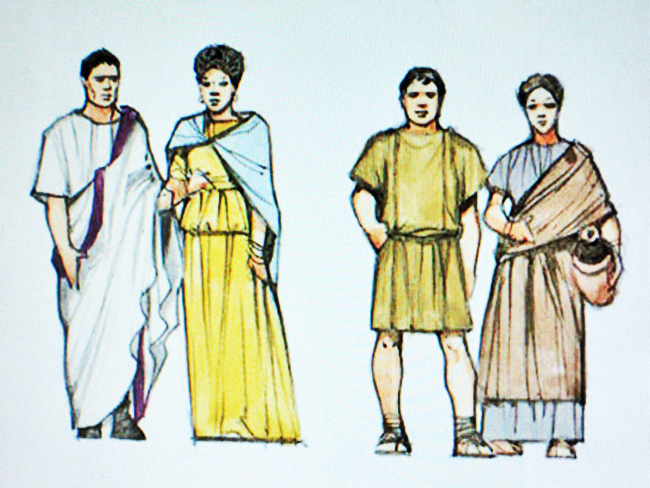|
from
ClassicalWisdom Website
To understand the political, social, economic and military developments that happened in the Roman Republic, it is important to understand how early republican society functioned and was organized according to this class system.
This gave them a privileged status within the state.
The fact that the legal code was unwritten and only patricians could administer and interpret it meant they could bend the law to suit themselves, which they did. They could make it up as they went along.
In order to maintain the strict separation of the two social classes, patricians could not intermarry with plebeians.
Patricians in this era had a special form of marriage, the only one of three at the time thought to be recognized by the gods. They were married by confarreatio, by the pontifex maximus and the flamen Dialis (priest of Jupiter).
In this form of marriage the bride was entitled to a share of possessions and of the religious duties of the household.
priests of the Roman religion
This aristocratic class did not sully their hands with industry or trade, these aspects of the Roman economy were left to plebeians and foreigners, e.g. Greeks.
While away on campaign it was easy for a patrician to keep his properties productive, as they could afford the associated expenses.
They were small farmers, those who worked in in the crafts, labourers and traders. They were excluded from legal, political, economic and religious rights.
The Plebeians were subject to the power and authority of the consuls.
The consuls had power over the lives of the citizens, against their authority there existed no right of appeal. Plebeians were excluded from public office and the aristocratic senate.
In the assembly, plebeians who were not clients (tenants or dependents) of patricians could be outvoted by those who were. Plebeians were also kept out of the administration of the state's religious institutions and major priesthoods.
When a decision was handed down to them, no matter how unjust, they had no right of appeal.
Any notion for plebeians and their descendants of climbing the social ladder by marrying a patrician was quashed by the fact that they were not legally allowed to marry a patrician, but if they did marry any children from the marriage would automatically be classed as plebeian.
Marriage for plebeians took two forms:
Ancient Roman Marriage
The prospect of dire poverty among the plebeian order was very real, and they often had to be absent from working their land because of a duty to do military service.
This often led them to fall into debt, the debt law (unwritten) was very harsh. Also, during wartime they had to pay a military tax (tributum).
No share of public lands was granted to them and they could not graze their livestock on them. Trade was one way plebeians could make a lot of money, and some become wealthier than patricians.
With the power and influence money brought them they felt that they should have political rights, and they resented the fact that they did not.
A rich plebeian who could afford cavalry equipment could, within the ranks of the army, achieve a kind of equality with the patricians.
The grievances of the plebeians, and their striving for equality lasted in Rome's internal history for over 200 years of the early republic (Communism, Class Struggle and the Roman Republic).
The unwillingness of the patrician order to share power would be the source of great conflict and social upheaval during this period of Rome's history.
An understanding of,
...is a vital part of
understanding the subsequent changes that occurred in the lives of
Romans during the middle and late republican periods, and beyond...
|



